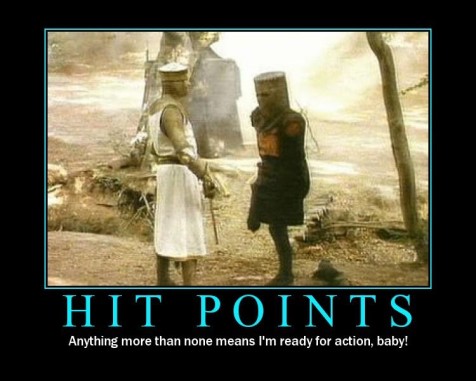
Hit Points, or HP, have been an important component of RPGs (first tabletop, then video games) since the very beginning. Ostensibly, HP is a measurement of a character’s health and/or ability to weather physical damage. When your HP drops to 0 or less, that means you’ve taken quite a beating; you’re knocked out of the action, and you may be at risk of dying. However, from an abstract, game-mechanics standpoint, HP actually has nothing to do with damage or health. What HP really is, is a pacing mechanism.
Before I continue, the discussion of HP as a pacing mechanism is not at all a new topic (nothing new under the sun, right?). In fact, while I was browsing the web in preparation for writing this article, I found a great article about this very topic from game designer Rob Donoghue; this post from The Book of Hanz also touches on this concept, albeit from the perspective of stress and consequences in Fate. I don’t want to rehash all the great points either Rob made in their respective writings, so suffice it to say that from a mechanics perspective HP functions as a way of measuring/pacing how long a fight should last – in general, the more HP participants in a fight have, the longer a fight will take.
[embedyt]https://www.youtube.com/watch?v=lC6dgtBU6Gs[/embedyt]
And that brings us to my main point, which is that HP shouldn’t be taken too literally. What I mean by this is that, because HP isn’t really measuring a character’s health/capacity to take damage, HP going down doesn’t necessitate the narrative of a character getting hit by a weapon. If you think about a lot of great works of fiction, fights rarely involve alternating blows and dodges in turn – they move around and jockey for position; they shield themselves behind cover; they block and parry opponents’ attacks. But these fights don’t last forever. Eventually, someone tires, gets in a lucky strike, gets captured, retreats, etc. If the epic fight scenes of fiction worked the way most gamers run them though, they would take a lot longer because they don’t involve that many hits, and the few hits that happen are decisive.
A common mistake/over-correction people make when trying to emulate a cinematic style of fighting is to adjust HP down and/or damage up, so that a single blow can take a character out of a fight. The problem with this is, if that’s all you do, you risk your fights becoming too short and anticlimactic if someone rolls well, because HP isn’t really about damage. So if you really want to have epic, cinematic combats like the kind that’s found in great fiction, you need to train yourself to think about HP differently. That roll to “hit”? Well, maybe you don’t actually wound your opponent, but the effort to block your attack tires them out a bit. You’re still coming closer to finishing the fight, but narratively no visible damage has been done. By the same token, successful “hits” could also be narratively described as effortful dodges, parries, or even short retreats. Just because HP goes down doesn’t mean that a character has to take damage – 0 HP just means the fight is over, one way or another. Whether it’s because a character is killed, knocked out, captured, or successfully retreats is entirely up to you and .your gaming group.
[embedyt] https://www.youtube.com/watch?v=Co3rfXnuWiI[/embedyt]
I think you’ll find that if you adopt this change of mindset, your combats will become that much more exciting, cinematic, and similar to those famous fictional combat scenes that inspire our imaginations. So stop taking HP so literally. HP is a pacing mechanism, not health or damage – treat it accordingly!
J.T. Dimino
Latest posts by J.T. Dimino (see all)
- The PC Factory: Aedan the Druid (Old School Essentials) - January 26, 2021
